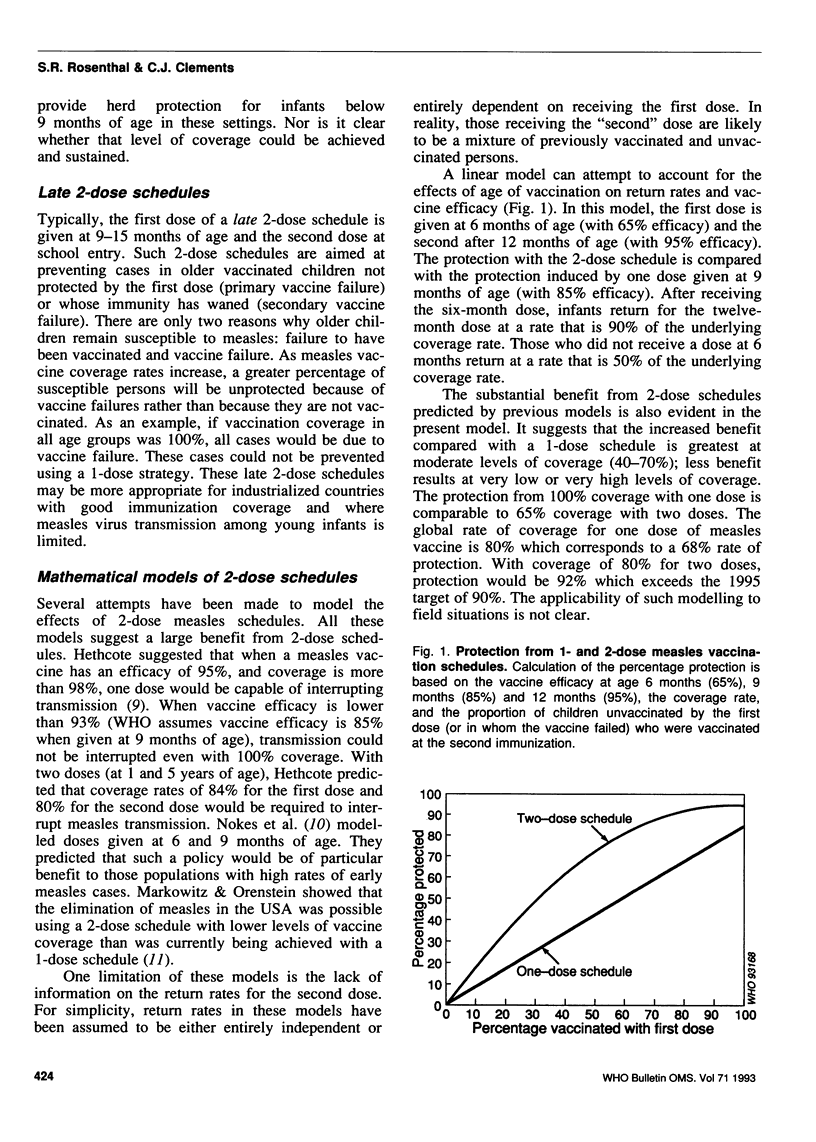Abstract
As measles continues to exact a high toll on infant mortality, particularly in developing countries, optimal strategies for the control of the disease are under discussion. As part of this debate, the place of 2-dose measles immunization schedules is reviewed regarding their potential as a strategy to improve measles control. To date, WHO has not recommended the use of a 2-dose schedule. A number of industrialized countries have already adopted a 2-dose schedule, often choosing to administer measles vaccine in the same injection as mumps and rubella vaccines. However, at present not enough is known about such schedules in developing countries to make global recommendations. Further research should include randomized controlled trials of early 2-dose schedules to investigate both technical and epidemiological issues such as the effect of blunting immunity and the duration of antibody. Long-term safety should be determined through studies of adequate size. Programmes already using 2-dose schedules are encouraged to evaluate their impact on disease incidence, cost, vaccine usage, and effect on coverage. Until further evaluation is complete, a high and timely coverage with one dose of measles vaccine in all areas remains the first priority for all immunization programmes.
Full text
PDF







Selected References
These references are in PubMed. This may not be the complete list of references from this article.
- Chikwem J. O., Erb J. A review of data on measles cases from sentinel surveillance sites in north-western Nigeria. Public Health. 1992 Jan;106(1):53–61. doi: 10.1016/s0033-3506(05)80329-4. [DOI] [PubMed] [Google Scholar]
- Fauveau V., Chakraborty J., Sarder A. M., Khan M. A., Koenig M. A. Measles among under-9-month-olds in rural Bangladesh: its significance for age at immunization. Bull World Health Organ. 1991;69(1):67–72. [PMC free article] [PubMed] [Google Scholar]
- Markowitz L. E., Orenstein W. A. Measles vaccines. Pediatr Clin North Am. 1990 Jun;37(3):603–625. doi: 10.1016/s0031-3955(16)36907-3. [DOI] [PubMed] [Google Scholar]
- Markowitz L. E., Sepulveda J., Diaz-Ortega J. L., Valdespino J. L., Albrecht P., Zell E. R., Stewart J., Zarate M. L., Bernier R. H. Immunization of six-month-old infants with different doses of Edmonston-Zagreb and Schwarz measles vaccines. N Engl J Med. 1990 Mar 1;322(9):580–587. doi: 10.1056/NEJM199003013220903. [DOI] [PubMed] [Google Scholar]
- Murphy M. D., Brunell P. A., Lievens A. W., Shehab Z. M. Effect of early immunization on antibody response to reimmunization with measles vaccine as demonstrated by enzyme-linked immunosorbent assay (ELISA). Pediatrics. 1984 Jul;74(1):90–93. [PubMed] [Google Scholar]
- Porter J. D., Gastellu-Etchegorry M., Navarre I., Lungu G., Moren A. Measles outbreaks in the Mozambican refugee camps in Malawi: the continued need for an effective vaccine. Int J Epidemiol. 1990 Dec;19(4):1072–1077. doi: 10.1093/ije/19.4.1072. [DOI] [PubMed] [Google Scholar]
- Remme J., Mandara M. P., Leeuwenburg J. The force of measles infection in East Africa. Int J Epidemiol. 1984 Sep;13(3):332–339. doi: 10.1093/ije/13.3.332. [DOI] [PubMed] [Google Scholar]
- Shasby D. M., Shope T. C., Downs H., Herrmann K. L., Polkowski J. Epidemic measles in a highly vaccinated population. N Engl J Med. 1977 Mar 17;296(11):585–589. doi: 10.1056/NEJM197703172961102. [DOI] [PubMed] [Google Scholar]
- Stetler H. C., Orenstein W. A., Bernier R. H., Herrmann K. L., Sirotkin B., Hopfensperger D., Schuh R., Albrecht P., Lievens A. W., Brunell P. A. Impact of revaccinating children who initially received measles vaccine before 10 months of age. Pediatrics. 1986 Apr;77(4):471–476. [PubMed] [Google Scholar]
- Wilkins J., Wehrle P. F. Additional evidence against measles vaccine administration to infants less than 12 months of age: altered immune response following active/passive immunization. J Pediatr. 1979 Jun;94(6):865–869. doi: 10.1016/s0022-3476(79)80203-6. [DOI] [PubMed] [Google Scholar]



